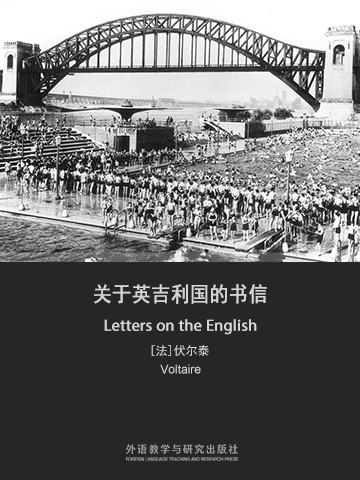本书以书信形式撰写而成,一封信为一个方面,共二十一封信。书中,伏尔泰以其繁睿深刻的哲学视觉、文采横溢的笔触,对哲学、宗教、自然科学、文学、历史等,进行了不偏不倚而又犀利的评述。他的论点大胆,又充分体现了保持平衡的主导思想,恰当地辨别了各个方面的“优缺点”,如牛顿的伟大和迷信;英国悲剧的无趣味,却刺激了法国戏剧界;公谊会信徒的德性理智,却滑稽可笑等等。本书是为人所最喜爱的和影响最大的伏尔泰许多著作之一。
Voltaire wrote these letters during his two-year stay in England. The letters are a true reflection of his ideas and his intolerance for the naive. He comments on the religious beliefs, political attitudes and social values of the English. He critically analyzes and satirizes different institutes of England. An engrossing work!
本书是伏尔泰的哲学和政治思想代表作。伏尔泰于1726~1729年被迫流亡英国,本书是他在英国的观感和心得的总结,1733年首先在英国出版英文版,法文版于1734年问世。
伏尔泰在书中向法国读者介绍F.培根、洛克和牛顿的思想,并表述了自己的哲学思想。像洛克一样,他的哲学思想前提是承认物质世界的客观性。书中重点论述认识论问题,认为人的一切观念都来自感官对外界事物的感觉,感觉是感官接受外物刺激引起的。它强调感觉是观念的唯一来源,人的头脑唯一具有的能力是对感觉得来的观念进行组合和整理。
Letters on the English (or Lettres philosophiques) is a series of essays written by Voltaire based on his experiences living in England between 1726 and 1729 (though from 1707 the country was part of the Kingdom of Great Britain). It was published first in English in 1733 and then in French the following year, where it was seen as an attack on the French system of government and was rapidly suppressed.
In some ways, the book can be compared with Democracy in America by Alexis De Tocqueville, in how it flatteringly explains a nation to itself from the perspective of an outsider, as Voltaire's depictions of aspects of English culture, society and government are often given favourable treatment in comparison to their French equivalents.
- Introductory Note
- Letter I—On the Quakers
- Letter II—On the Quakers
- Letter III—On the Quakers
- Letter IV—On the Quakers
- Letter V—On the Church of England
- Letter VI—On the Presbyterians
- Letter VII—On the Socinians, or Arians, or Antitrinitarians
- Letter VIII—On the Parliament
- Letter IX—On the Government
- Letter X—On Trade
- Letter XI—On Inoculation
- Letter XII—On the Lord Bacon
- Letter XIII—On Mr. Locke
- Letter XIV—On Descartes and Sir Isaac Newton
- Letter XV—On Attraction
- Letter XVI—On Sir Isaac Newton’s Optics
- Letter XVII—On Infinites in Geometry, and Sir Isaac Newton’s Chronology
- Letter XVIII—On Tragedy
- Letter XIX—On Comedy
- Letter XX—On Such of the Nobility as Cultivate the Belles Lettres
- Letter XXI—On the Earl of Rochester and Mr. Waller
- Letter XXII—On Mr. Pope and Some Other Famous Poets
- Letter XXIII—On the Regard That Ought to be Shown to Men of Letters
- Letter XXIV—On the Royal Society and Other Academies
- 书评 写书评
- 笔记
-
书评加载中...























 京公网安备 11010802032529号
京公网安备 11010802032529号
笔记加载中...